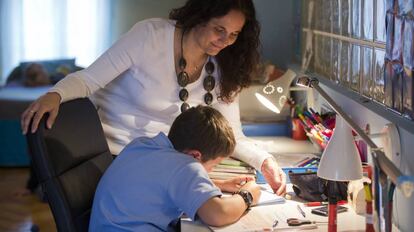Spain’s students put down their pens for a weekend homework strike
Parents are being encouraged to take children to museums and play sports instead
The Spanish Alliance of Parents’ Associations (CEAPA), a network that covers some 12,000 state schools across the country, has called a strike on weekend homework for primary and high school students for the month of November.

It says the unprecedented move is in response to mounting complaints by parents that their children are being overloaded with ever-larger amounts of out-of-school-hours studies.
The organization challenges the idea that homework improves children’s knowledge acquirement, saying that infants are being pressed too early to read and that a lot of the work children are given to complete out of school hours is repetitive and uninspiring. “We are absolutely certain that homework is detrimental to children and damages their extra-curricular development,” says José Luis Pazos, president of the CEAPA.
The debate over the benefits of homework kicked off in Spain last year
“We are not sure how many parents will support the strike, but we know that there is also widespread support outside CEAPA, because parents are constantly contacting us that are not part of our associations. We get dozens of emails about this every day,” says Pazos.
CEAPA is calling on parents to organize a range of extra-curricular activities for their children instead of assisting them with homework over the weekend. These include visiting museums and art galleries, as well as painting and drawing at home, along with sports. The organization has provided information for parents on its website, along with a draft note for the school explaining why they haven’t done their homework.
According to a 2012 PISA education report by the Organization for Economic Cooperation and Development, Spain was the fifth nation with the most homework after Russia, Italy, Ireland and Poland out of 38 countries studied, with 6.5 hours a week compared to an average of 4.9.
The heavier workload does not necessarily translate into better results for Spanish students, whom the PISA report traditionally gives low scores in maths, reading and science.
CEAPA challenges the idea that homework improves children’s knowledge acquirement
By contrast, in Finland and South Korea – two of the countries with best student performances according to PISA — the average time spent on homework every week was less than three hours.
A survey for EL PAÍS carried out by Metroscopia in early October showed that most parents believed their children were being given too much homework: 27% said they thought the amount was right, with only 3% saying too little homework was being handed out by schools.
Pazos says that education in Spain was still very reliant on the traditional method of rote-learning – memorizing work. Pointing to the availability of information in current society, he said that “what we have to teach children isn’t to memorize everything, but how to manage information, to be critical, to select what is worth it and what isn’t.”
“Spanish society has changed deeply, but the environment in the classroom hasn’t,” says Pazos.
The debate over the benefits of homework kicked off in Spain last year, when mother of three Eva Bailén began to collect signatures for a petition demanding a reduction in homework after watching her middle child lose out on the chance to play throughout his childhood. Her campaign is ongoing and has triggered attempts throughout the country to regulate homework. CEAPA joined the campaign and began to demand a sharp reduction in homework.
At the start of this school year, the issue broke onto the political agenda when acting Education Minister Iñigo Méndez de Vigo recognized the need for “reflection” over the issue, with the regional governments of Madrid, the Canary Islands and Murcia all approving recommendations to reduce homework time.
English version by Nick Lyne.
Tu suscripción se está usando en otro dispositivo
¿Quieres añadir otro usuario a tu suscripción?
Si continúas leyendo en este dispositivo, no se podrá leer en el otro.
FlechaTu suscripción se está usando en otro dispositivo y solo puedes acceder a EL PAÍS desde un dispositivo a la vez.
Si quieres compartir tu cuenta, cambia tu suscripción a la modalidad Premium, así podrás añadir otro usuario. Cada uno accederá con su propia cuenta de email, lo que os permitirá personalizar vuestra experiencia en EL PAÍS.
¿Tienes una suscripción de empresa? Accede aquí para contratar más cuentas.
En el caso de no saber quién está usando tu cuenta, te recomendamos cambiar tu contraseña aquí.
Si decides continuar compartiendo tu cuenta, este mensaje se mostrará en tu dispositivo y en el de la otra persona que está usando tu cuenta de forma indefinida, afectando a tu experiencia de lectura. Puedes consultar aquí los términos y condiciones de la suscripción digital.









































